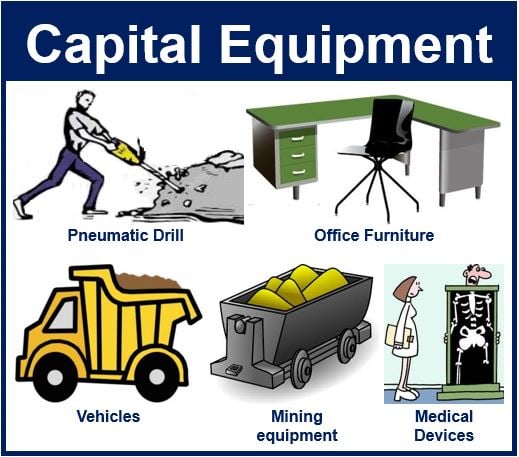Capital equipment refers to items that are not permanently attached to buildings or grounds (freestanding) and cost more than $5,000 net of sales tax, freight and installation costs. It must have a useful life of at least one year and is not consumed in the normal course of business.
If the item costs less than $5,000, is freestanding and has a use life of one year or more, it is generally known as non-capital equipment.
Capital equipment is used to manufacture a product or provide a service. It is used to sell, store and deliver merchandise (the term ‘merchandise has several meanings – in this context it means ‘goods’ or ‘products’).
 Capital equipment includes freestanding items that have a useful life of at least 1 year and are not consumed in the normal course of business.
Capital equipment includes freestanding items that have a useful life of at least 1 year and are not consumed in the normal course of business.
Generally classified by accountants as capital assets, capital equipment provides operating benefits over a sustained period.
Capital equipment may include items acquired in several different ways, which can be bought, leased or donated.
Some items, such as land or software, may meet the general requirements but tend to be excluded from the category.
Capital equipment definition varies
Items that are classed as capital equipment vary from business to business and industry to industry. In colleges and schools, it may include microscopes, scanning machines and computers. In the mining industry, it could include sifters, drills, or underground trains.
The acquisition of capital equipment items is generally planned, managed and financed on an organization-wide basis. Choices are generally decided by a committee, which receives capital funding requests and prioritizes them.
When it comes to capital budgeting, funding usually goes to the most important projects first. The company keeps approving proposals in order of priority until it hits its budget limit. On the other hand, smaller purchases (called non-capital items), like office supplies or short-term tools, are usually approved by individual managers at different levels of the company, without going through the same big process.
Video – Capital Equipment
In this video, James Kilgour, a capital equipment specialist, talks about his job. He selects equipment for specific veterinary practices. He says his service saves clients a great deal of time.
